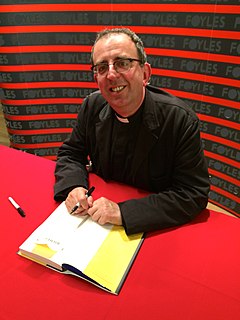A Quote by Steven Weinberg
Certainly good causes have sometimes been mobilized under the banner of religion, but you find the opposite, I think, more often the case.
Related Quotes
You find this curious fact, that the more intense has been the religion of any period and more profound has been the dogmatic belief, the greater has been the cruelty and the worse has been the state of affairs. In the so called age of faith, when men really did believe the Christian religion in all its completeness, there was the Inquisition, with its tortures; there were millions of unfortunate women burnt as witches; and there was every kind of cruelty practised upon all sorts of people in the name of religion.
If you want to pontificate, I'm certainly willing to pontificate. That's why Joely was laughing because you don't know what you asked for. Malcolm Gladwell, in his newest book "David and Goliath," writes about how sometimes things that we think of as handicaps often times are just the opposite. Or the reverse is also true.
For most problems found in mathematics textbooks, mathematical reasoning is quite useful. But how often do people find textbook problems in real life? At work or in daily life, factors other than strict reasoning are often more important. Sometimes intuition and instinct provide better guides; sometimes computer simulations are more convenient or more reliable; sometimes rules of thumb or back-of-the-envelope estimates are all that is needed.
It has always been more difficult for a man to keep than to get; for, in the one case, fortune aids, which often assists injustice; but, in the other case, sense is required. Therefore, we often see a person deficient in cleverness rise to wealth; and then, from want of sense, roll head over heels to the bottom.
I used to think that paired opposites were a given, that love was the opposite of hate, right the opposite of wrong. But now I think we sometimes buy into these concepts because it is so much easier to embrace absolutes than to suffer reality. I don't think anything is the opposite of love. Reality is unforgivingly complex.
I have no expertise of other religious traditions so I'm not going to opine on them, but in Islam the more you know about the religion, the more likely you're going to go to hell. Many people will find that paradoxical because we tend to think of religion as a way of making ourselves feel better and a way of damning and excluding infidels or reprobates or heretics or what have you. It was very hard for me to find an Islam that belongs to me and doesn't feel like it's been imposed on me.
I think there in a great deal to be said for religious education in the sense of teaching about religion and biblical literacy. Both those things, by the way, I suspect will prepare a child to give up religion. If you are taught comparative religion, you are more likely to realise that there are other religions than the one you have been brought up in. And if you are if you are taught to read the bible, I can think of almost nothing more calculated to turn you off religion.




































